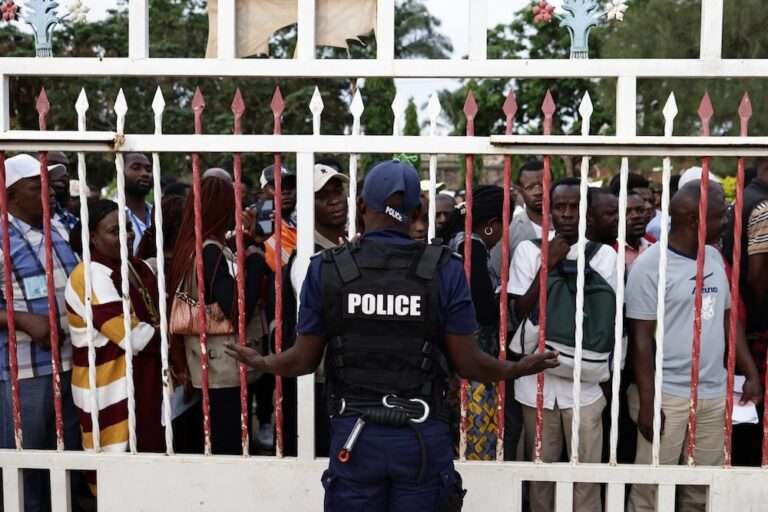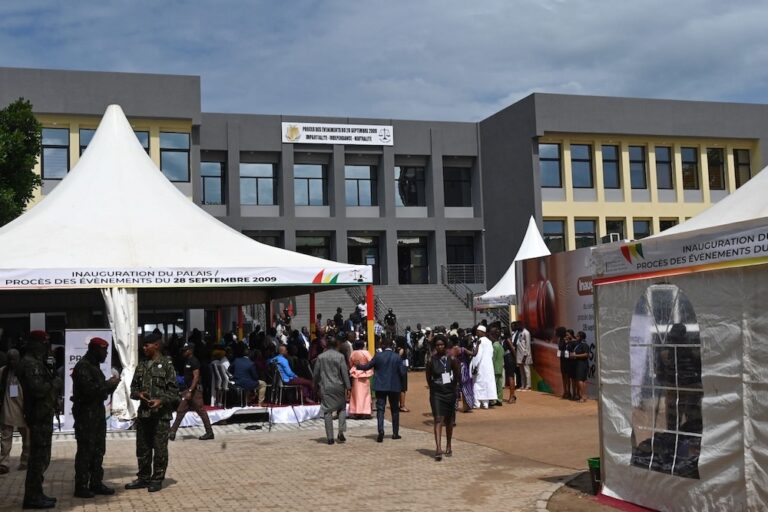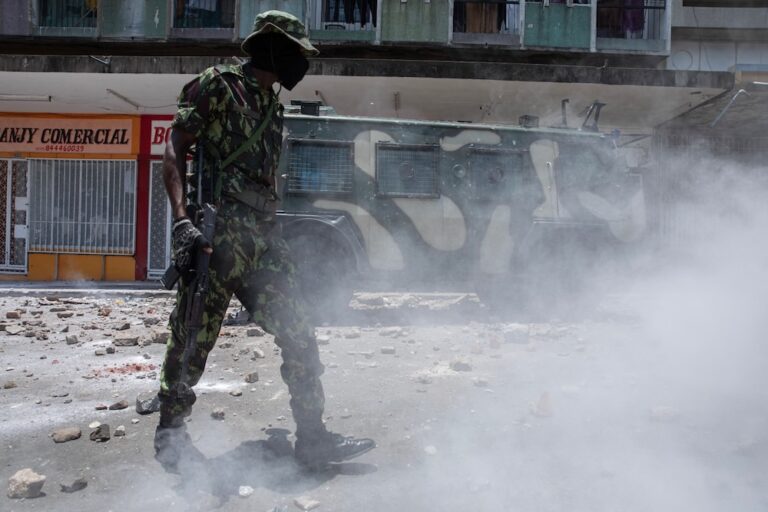May and June 2022 in Africa: A free expression round up produced by IFEX’s regional editor Reyhana Masters, based on IFEX member reports and news from the region.
May and June offered a few celebratory moments, including the Africa Day (25 May) official online launch of “Pounding Pavement, Knocking on Doors” by Liberian President George Weah, on behalf of members of the African Platform on Access to Information – a working group formed in 2009 with the aim of promoting access to information on the continent.
The publication includes the backstory of how African CSOs led a decade-long advocacy process that culminated in the UN General Assembly unanimously adopting the resolution to recognise 28 September as the International Day for Universal Access to Information (IDUAI).
The title captures the relentless effort of APAI members and in particular the protagonists – who knocked on the doors of various stakeholders on the continent, as well as in Paris, and Manhattan – to garner support from member states for the resolution to be passed at the UN General Assembly.
Seychelles makes impressive leap in 2022 World Press Freedom Index rankings
Seychelles leapt 39 places to be ranked as Africa’s haven of freedom of expression and media rights in the Reporters Without Borders 2022 World Press Freedom Index. The ranking, which takes into account a country’s legal framework, the media landscape and safety, and political and economic markers, makes Seychelles the unanticipated leader on the African continent, ranked 13th globally.
The index commended the archipelago nation for its media pluralism, protection of sources, and the outlawing of criminal defamation. The peaceful transition of political power to the opposition following the historic results of its 2020 election undoubtedly contributed to the rise in its ranking.
On the other end of the spectrum, Eritrea was rated 179th out of the 180 countries, retaining its infamous reputation as the country with the highest number of detained journalists on the continent.
Ghana, once ranked among the top countries for its protection of media freedom dropped 30 places to be ranked 60th globally, and 10th in Africa. Fellow West African nations Togo and Senegal also recorded steep falls in rankings. As the Media Foundation for West Africa’s executive director Sulemana Braimah warned earlier this year– the media’s “crisis in journalistic practice, oppression of media freedom and the muzzling of free speech […] have the potential to reverse Ghana’s modest gains towards democratic consolidation, peace and security.”
Concerned by the regression in the region, the regional secretariat of the Media Institute of Southern Africa sent a letter to Tanzania’s President Jakaya Kikwete in his capacity as chair of SADC’s Panel of Elders.
ATI: Namibia on the cusp of enacting new law
On 21 June, Namibia moved one step closer to having its Access to Information Bill enacted. Having been passed by the National Assembly, it now has to be approved by the National Council before President Hage Geingob can sign it into law.
The Bill was first introduced to the National Assembly in June 2020, but was sent back to the Standing Committee on ICTs for further public consultation following objections by civil society organisations. As the version currently under consideration has not been shared publicly, it is not possible to determine if any of the inputs and proposals made by civil society were incorporated.
The biggest concerns with the original draft were the blanket confidentiality of Cabinet proceedings and decisions, the narrow public interest override, the appointment of the information commission, and the definition of personal information. In its analysis, the Centre for Law and Democracy says that if the needed changes are made to some of its weaker elements, the bill could be among the top 10 ATI laws in the world.
TikTok, disinformation, and Kenya’s shrinking civic space
With Kenya headed to what is being described as one of its most highly contested polls on 9 August, numerous concerns are being raised amid what has been described as “acute intra-elite tensions.”
The recently updated Civicus Watchlist, which draws attention to countries where there is a serious, and rapid decline in respect for civic space, now categorizes Kenya’s civic space rating as “obstructed”, describing it as a state where “authorities systemically use excessive and lethal force against peaceful protesters, journalists face brutal and fatal attacks for their work, while the LGBTQI+ community faces unprecedented attacks and repression.”
Access to information is essential for a healthy civic space. In a country famed as the tech hub of Africa, the information war has moved online. IFEX member CIPESA has highlighted the “multi-layered information ecosystem where disinformation is fueled by political, economic and personal interests. It is a sophisticated commercial enterprise facilitated, in part, by the ease of access to multiple digital technologies.”
Social media platforms are again taking center stage – but not necessarily accountability. In “From Dance App to Political Mercenary: How disinformation on TikTok gaslights political tensions in Kenya”, Mozilla Fellow Odanga Madung identified over 130 TikTok videos featuring hate speech, incitement, and other political disinformation. The disinformation is described as similar to the Cambridge Analytica and Harris Media content that appeared on Kenyan Facebook in 2017.
TikTok has since taken down some of the questionable content and accounts, but Madung contends that “rather than learn from the mistakes of more established platforms like Facebook and Twitter, TikTok is following in their footsteps, hosting and spreading political disinformation ahead of a delicate African election.
Taking a regional perspective on the disinformation issue in its new report,“Disinformation Pathways and Effects on Democracy and Human Rights in Africa”, CIPESA points out that “rather than serving to counter the ills of disinformation, related laws have in most cases been used to target political critics, while government officials complicit in promoting disinformation are protected.”
World Press Freedom Day in Arusha
Coinciding with the global celebration of World Press Freedom Day (WPFD) on 3 May, the East African Editors Society hosted the first-ever Africa Media Convention (AMC) in the resort city of Arusha in Tanzania. Journalists, online news service providers, digital and other rights groups, government officials and regional bodies attended the event under UNESCO’s WPFD theme “Journalism Under Digital Siege”.
Tanzanian President Samia Suluhu Hassan presented the keynote address at the AMC. This marked the first time in a decade that a head of state officiated at a continental event focused on media freedoms. It was also a noteworthy departure from the frosty relationship between her predecessor, the late John Magufuli, and the media. More fondly referred to as Mama Samia by Tanzanians, Hassan has been taking gradual steps to change the restrictive environment since stepping into the role of head of state following Magufuli’s death. The ban on four newspapers was lifted earlier in the year, and she has reiterated her promise to amend the restrictive Media Services Act of 2016.
Despite these promising moves, optimism about real progress is at best approached with caution. The remarks by Hassan and Tanzanian Member of Parliament Nape Nnauye were fairly nuanced. Nnauye “urged journalists in the country to work diligently by adhering to laws and regulations set for them,” while Hassan called on journalists to be patriotic, and speak positively of Africa. Hassan promised to implement media legal reforms, but warned “before that, discussions [will] be conducted, to put clearly the limits of freedom.”
Calling out homophobia, biphobia and transphobia
Across the sub-Saharan region, the lesbian, gay, bisexual, transgender and intersex (LGBTQI+) community continues to face criminal sanctions where same-sex relationships are outlawed. Even in countries that recognise sexual minorities, discrimination is still rife.
Despite a ban on protests, Kenyan activists took to the streets on the 2022 International Day against Homophobia, Biphobia and Transphobia (IDAHOBIT), calling for the de-criminalisation of homosexuality in the country.
This year’s celebration took place against the backdrop of the tragic murder of non-binary person Sheila Adhiambo Lumumba in Kenya. Lumumba was raped and killed in her home – a place that should have been a safe haven. It prompted local writer, journalist, human rights defender and podcaster Kevin Mwachiro to pose the question: “Will we in Kenya ever respect each other’s bodies, lives and rights?”
“We are turning into a nation where those who stand out or speak out or choose to be different, and more so our women, find themselves abused or assaulted or with bludgeoned bodies, shattered spirits, skittish steps, and deflated dreams.”
The levels of discrimination, harassment and violence directed towards members of the LGBTQI+ community was further evidenced in Ghana, where billboards mounted by activists in a few of Ghana’s cities with the inscription “Love, Tolerance and Acceptance” were torn down by members of the public, egged on by a member of parliament. The toxic messaging of politicians and their conservative supporters against sexual minorities is one of the main causes of the levels of negative sentiment, and in turn a rise in persecution of LGBTQI+ persons.
Ethiopian crackdown on press freedom amps up
The Ethiopian authorities’ displeasure at the reporting on the country’s ethnic conflict has translated into relentless pressure on the media sector. The ongoing harassment, arrests, arbitrary arrests, prolonged detentions and expulsion of foreign journalists is aimed at subduing journalists from covering critical issues.
Just over a year ago, the Ethiopian government released a statement condemning what it described as “unwarranted and unsubstantiated allegations on the stifling of dissent and a crackdown on journalists that some media outlets propagate these days …” which it claimed had “no other purpose than to tarnish the government’s image …”
Commenting on the mass arrests throughout May, Daniel Bekele, the chief commissioner of the Ethiopian Human Rights Commission (EHRC), a state-affiliated independent rights body, said: “the arrest of media personnel is particularly alarming… and its repercussions extend beyond media space and freedom of expression.”
Sadibou Marong, the director of Reporters Without Borders’ West Africa bureau, said: “In a country suffering an acute humanitarian and political crisis, clashes must not be used by the authorities as a pretext for curbing press freedom.”
In Brief
Senegal: Leaders of the country’s ruling party Benno Bakk Yaar (BBK) apologised to DakarBuzz journalist Ndeye Ngoné Diop after she was jeered and heckled by supporters, during a press briefing.
Cameroon: Sports journalist Eyong Macdella Bessong was dragged away from the main pitch minutes before the start of a soccer game, after she was only able to produce a digital copy of her press accreditation instead of a hard copy. “Bessong told CPJ that the stadium director manhandled her and grabbed her torso, touching her breast, so she bit his hand, prompting him to order a group of six policemen to remove her from the property.”
Mozambique: Amended anti-terror legislation that awaits President Felipe Nyusi’s signature contains clauses that could criminalize reporting about the insurgency in northern Mozambique. “Journalists reporting on terrorism in the country could face between 8 to 12 years in prison.”



